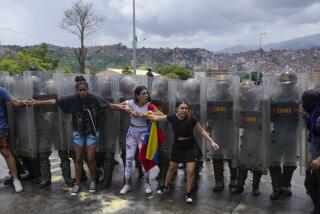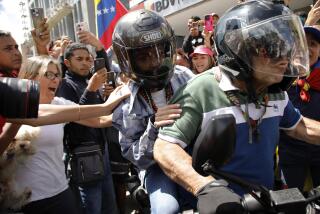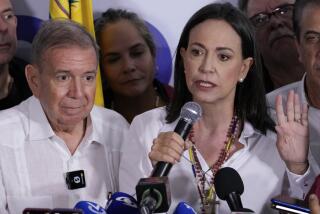Mugabe rival takes refuge in embassy
- Share via
HARARE, ZIMBABWE — Zimbabwe opposition leader Morgan Tsvangirai sought refuge in the Dutch Embassy here just hours after he pulled out of the presidential runoff election scheduled for Friday, citing rising violence by supporters of longtime President Robert Mugabe.
Despite the opposition’s withdrawal, the Zimbabwe ruling party’s crackdown continued unabated Monday, with 60 opposition activists arrested by riot police in a lunchtime raid at the opposition headquarters. Curfews and door-to-door searches also continued in suburbs of Harare, the capital.
Many of those arrested at the Movement for Democratic Change headquarters had been injured in recent outbreaks of political violence and were sleeping at the office for their safety. More than 80 activists with the opposition Movement for Democratic Change were admitted to clinics in Harare on Sunday, severely beaten by ruling ZANU-PF party operatives when they tried to attend a rally.
In New York, the United Nations Security Council voted unanimously to condemn the violence and intimidation by Zimbabwe’s government and said that “a free and fair election” is impossible at this point.
Nevertheless, Zimbabwe’s U.N. ambassador, Boniface Chidyausiku, said after the session that the runoff would proceed as planned and that the Security Council had no business meddling in his country’s elections.
In Harare, there was no official comment from the MDC on Tsvangirai’s decision Sunday evening to seek refuge at the Dutch Embassy. The move took some senior MDC officials by surprise.
Nor were there any details about the security threat that led Tsvangirai to seek refuge, but MDC officials said the ruling party’s anger over the opposition leader’s withdrawal from the vote had heightened concern about his security.
Dutch officials told the Associated Press that Tsvangirai had sought temporary political refuge, not political asylum.
Leaders across the world expressed concern Monday over the violence that led Tsvangirai to pull out of the election, and ruling party officials held crisis meetings to decide how to handle the surprise move.
At the U.N., Secretary-General Ban Ki-moon took an unusually strong stand, saying, “The situation in Zimbabwe represents the single greatest challenge to regional stability in southern Africa today.”
The Security Council, in its 15-0 vote, declared that the results of the initial March 29 presidential balloting “must be respected.” Zimbabwe’s election commission ruled that Tsvangirai had received the most votes in that election but not an absolute majority needed to avoid a runoff. Tsvangirai has said he won with more than 50% of the vote.
The Security Council statement was the result of hours of negotiation that overcame South Africa’s objections to having the issue on the agenda. British Ambassador John Sawers called the unanimous condemnation “important” and “far-reaching.”
Earlier in the day, U.S. Secretary of State Condoleezza Rice condemned the attacks by Mugabe supporters that she said necessitated Tsvangirai’s pullout.
“Yet another vicious assault on the opposition and its supporters for exercising their right to assemble and their right to free speech has reinforced that it is impossible for there to be a free, fair or peaceful election in Zimbabwe on June 27,” Rice said in a statement. “The Mugabe regime cannot be considered legitimate in the absence of a runoff.”
African Union Chief Executive Jean Ping expressed “grave concern” about the violence in Zimbabwe and Tsvangirai’s pullout.
Tsvangirai had left Zimbabwe soon after the first round of voting, citing a security threat. He delayed his return to campaigning because of alleged intelligence about a possible assassination plot. Since his return to Zimbabwe, Tsvangirai has been repeatedly harassed, detained or arrested by police, and his campaign car was impounded.
His deputy, Tendai Biti, was arrested on his return and faces treason charges, which carry the death penalty. Some 85 opposition activists and officials have been killed, and about 3,000 beaten, according to human rights groups.
MDC official Fortune Gwaze, a witness to Monday’s police raid on the opposition headquarters, said there had been 1,300 activists sleeping in MDC headquarters, victims and refugees from violence around the country. Most had left the building because of a tip about the raid the previous night.
“Everybody’s life is under threat, especially the leaders,” said one opposition official based at MDC headquarters who requested anonymity, saying police were searching for him. “They want my head here. Everybody’s in hiding.”
Ruling party officials Monday told The Times they feared that the opposition election boycott would fuel pressure on the regime and lead to tougher international sanctions.
“They will say the election wasn’t free and fair, that the election was stolen,” one official said in an interview, speaking on condition of anonymity. “We think they will intensify international sanctions and maybe look for a chance to intervene militarily.”
Tsvangirai’s move undercuts the chances of the ruling party forming a government of national unity dominated by ZANU-PF but with some MDC representation. Several ruling party officials said that such a government would help it regain international legitimacy and the foreign investment desperately needed to kick- start Zimbabwe’s collapsed economy. Jonathan Moyo, an independent member of parliament and Mugabe’s former right-hand man, said the president had “survived by the skin of his teeth.” But he said that even if Mugabe were declared the default winner, he still would have to accept a government of national unity, because the ruling party lacks a parliamentary majority and the country is in economic chaos.
Moyo said that Tsvangirai’s withdrawal from the election probably would mean that he would be given no role in such a government. But he speculated that the ruling party would do its best to entice other opposition parliament members to join a unity government, offering salaries and cars.
“I think in the final analysis the majority will go for the patronage of the state,” he said.
Tsvangirai is obliged to inform the Zimbabwe Electoral Commission in writing that he is withdrawing from the runoff. Ruling party officials said that if that happened the commission probably would declare Mugabe the winner, canceling the second round.
But until there is a formal announcement, the party is planning to press ahead with campaigning and the commission has said the vote still will be held Friday.
There were growing signs Monday that ZANU-PF commanders cannot fully control the unruly youth militias who have been beating opposition supporters. The ruling party is unable to feed all the youths deployed at about 900 makeshift bases in schools and kindergartens around the country.
A ZANU-PF base commander said in an interview Monday in Harare that there was a base for youth militias in every electoral ward.
Speaking on condition of anonymity, he said the youths had been given too much power by the Youth Ministry, which promised them immunity for their actions during the election campaign.
In a district outside Harare, ZANU-PF youths looted a market Monday, taking food and other merchandise.
--
Times staff writer Maggie Farley at the U.N. contributed to this report.
More to Read
Sign up for Essential California
The most important California stories and recommendations in your inbox every morning.
You may occasionally receive promotional content from the Los Angeles Times.













